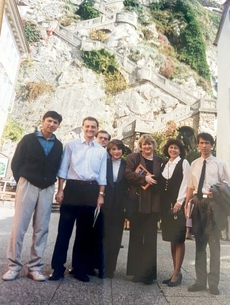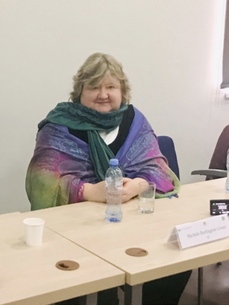30th Work Anniversary: Interview with Michele Burlington-Green, Chief of Administration at the JVI
October 27, 2022

Michele with some participants of Comprehensive Course 4 in Applied Market Economics in 1995

This year the JVI celebrates 30 years as a training center. We use this occasion to talk to Michele Burlington-Green, who is celebrating 30 years at the JVI.
Michele, you have been with the JVI since its establishment in 1992. Can you tell us about your first weeks?
It was early Friday morning on August 14, 1992, when I first arrived at the Austrian Customs Training Center (Bundeszoll-und-Zollwachschule-ZWS) in Vienna’s 3rd district, where the then-newly established JVI was housed. I marveled at the vast size of the beehive-like yellow and white building. The building comprised training facilities (offices, lecture, and workshop rooms) for three groups in parallel, as well as accommodation for up to 100 participants. I was feeling a mixture of excitement but also some trepidation from being part of the administrative team responsible for setting up the JVI from scratch.
I was met by the Chief of Administration, Karin Schumacher, and fellow Course Administrator, Iwona Kabat (later Iwona Kabat Lefebre), from whom I received a warm welcome. By the end of the day, I was already assigned to a two-week World Bank course on “Natural Monopolies” that was to commence just two weeks later. The period leading up to the institute’s opening sped by. The days were long but there was a great team spirit and a lot of laughter as we strove to put in place the procedures needed for successful course management. Everyone pitched in, including the JVI Director, Andrew Beith, putting together welcome packs. We were all from different parts of the globe but there was a special camaraderie—the JVI family group was born.
Can you provide us with an overview of your role: how it started and how it evolved?
I moved to Vienna from London where I had worked for five years for Intourist London (part of the former USSR State Committee for Foreign Travel), latterly as the Manager for Conference and Incentive Travel. I was looking for a change for personal reasons and only planned to stay one to two years but was fortunate to have the opportunity to stay much longer. From August 1992-August 2002 I was a Course Administrator, then I became Senior Course Administrator, and finally I was promoted to Chief of Administration, a post I have held since the late summer of 2004 to date.
The role evolved from course management/logistics to include the annual scheduling, brochure production and assignments such as overseeing the PO and interpreter teams, close liaison with partner institutions and the local Austrian authorities, as well as HRM and general operations.
How would you describe your experience working at the JVI? What makes the JVI unique?
It has been a privilege working for the JVI for over 30 years and see it develop into the renowned regional training institute that it is today. The feedback from alumni (currently over 50 thousand) clearly shows the impact that it has made in the institutions receiving training—namely, the JVI catchment areas of Central, Eastern, and Southeastern Europe, the Caucasus, Central Asia, Iran, and Türkiye. Many former alumni hold key positions in their central banks or ministries, including governor and minister-level posts, and, in a few cases, some have become president of their respective countries.
The JVI’s uniqueness is also due to the composition of its stakeholders and the generous, financial support from the Primary Members—the Austrian Authorities who provide the training and accommodation facilities and the International Monetary Fund, as well as the Contributing Members, who provide training in their respective courses, and JVI collaborative events, not forgetting the courses run in cooperation with various central banks. The JVI is also unique in that it has always been a neutral platform where all parties are free to exchange ideas and discuss matters openly. Networking and peer-to-peer learning is actively encouraged.
Interpretation and the excellent team of JVI and freelance interpreters have also played a pivotal role, facilitating the learning process for many countries, and we still see a demand in various regions to have courses with interpretation.
On a personal level, I am very fortunate and humbled to have so many colleagues and life-long friends from all over the world.
And how does the JVI today compare to the JVI in 1992? Undoubtedly, there are many changes, but which ones do you think are most noteworthy?
The courses in the 1990s were more elementary, longer in duration (e.g., basic economics and macroeconomic analysis and financial policies—totaled 9 weeks), meeting the needs of the time, as formerly centrally planned economies started to transition to more market-based ones.
The JVI’s flagship course, the Comprehensive Course in Applied Economics (now the Applied Economic Policy course — AEP), was initially 18 weeks and included segments from almost all JVI member organizations covering a broad spectrum of topics, including financial programming and policies, and macroeconomic management issues, governance and public sector management, as well as social and labor market and financial sector issues amongst others. Over the years, it has become clear that institutions cannot allow their staff to be away for such long periods. The 2023 offering of the AEP course is four weeks in Vienna, but it also includes pre-course online training elements as well as virtual interactions. Courses are becoming shorter in general, many are of a one or two-week duration, and are more practical, as well as more technical in nature.
You are certainly the institutional memory of the JVI, and you also have many anecdotes about staff, course participants and our stakeholders. Any one of those you would like to share with the Newsletter?
There are so many that is it not easy to single out just one.
- I still remember in the early 90s participants brought food from their home countries for us to sample—delicacies such as yak meat, as well as fruit and nuts, cheese, and homemade bread, washed down with fermented horse milk (Kumis) and local wines, cognac, and vodka, or black tea.
- Many an evening was spent after classes cooking and socializing in the large communal kitchens. These international evenings where everyone cooked became an important social and mainstay event during the CC and AEP courses.
- In the former ZWS, those participants whose rooms faced the inner courtyard were also woken some mornings by the military bands of the customs officers who lived in the same building.
- Finally, the JVI became not just a place of learning and networking. Following the longer courses such as the CC and AEP ones, marriages ensued. I have four participants from one of my 1998 courses from various countries who met at the JVI and subsequently married.
The JVI is undoubtedly special—a place of peer-to-peer learning, knowledge exchange, and where life-long friendships are formed.
Rilind Kabashi, Economist, Joint Vienna Institute











